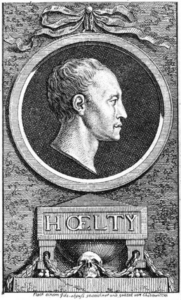May song
(Poet's title: Mailied)
Set by Schubert:
D 130
canon for three voices[1815?]
D 202
duet for voices or horns[May 26, 1815]
Der Schnee zerrinnt,
Der Mai beginnt,
Die Blüten keimen
Den Gartenbäumen,
Und Vogelschall
Tönt überall.
Pflückt einen Kranz,
Und haltet Tanz
Auf grünen Auen,
Ihr schönen Frauen,
Wo junge Main
Uns Kühlung streun.
Wer weiß, wie bald
Die Glocke schallt,
Da wir des Maien
Uns nicht mehr freuen:
Wer weiß, wie bald
Die Glocke schallt!
Drum werdet froh!
Gott will es so,
Der uns dies Leben
Zur Lust gegeben!
Genießt der Zeit,
Die Gott verleiht!
The snow is melting,
May is beginning,
The blossoms are sprouting
On the trees in the garden
And the sound of birds
Can be heard everywhere.
Pluck a garland
And hold a dance
On the green meadow
You beautiful women,
Where young May blossoms
Strew coolness over us.
Who knows how soon
The bell will toll!
Since May is something we
Shall not enjoy any more:
Who knows how soon
The bell will toll!
So, be happy!
God wills it thus,
He who gave us this life,
A life given to us for enjoyment!
Enjoy the time
That God has made available!
All translations into English that appear on this website, unless otherwise stated, are by Malcolm Wren. You are free to use them on condition that you acknowledge Malcolm Wren as the translator and schubertsong.uk as the source. Unless otherwise stated, the comments and essays that appear after the texts and translations are by Malcolm Wren and are © Copyright.
☙
Themes and images in this text:
Bells Birds Cold Dancing Fields and meadows Flowers Gardens Green Joy May Snow Songs (general) Time Trees (general) Wreaths and garlands
Ludwig Christoph Heinrich Hölty (1748 – 1776) was the son of a Lutheran pastor. When he was a theology student at Göttingen University he was a founder member of the Göttinger Hainbund, a group of devotees of the pietist poet Klopstock. It might therefore seem strange that someone with such a devout background should so cheerfully encourage people to ‘Eat, drink and be merry, for tomorrow we die’.
However, this is to misunderstand the Lutheran tradition. Unlike Calvin and the Reformed tradition of Protestantism, Luther never set up a dichotomy between ‘spirit’ and ‘flesh’. Indeed, he saw the incarnation of Christ as evidence that God was everywhere in our world, including within our bodily appetites.
☙
Original Spelling Maylied Der Schnee zerrinnt, Der Mai beginnt, Die Blüten keimen Den Gartenbäumen, Und Vogelschall Tönt überall. Pflückt einen Kranz, Und haltet Tanz Auf grünen Auen, Ihr schönen Frauen, Wo junge Main Uns Kühlung streun. Wer weiß, wie bald Die Klocke schallt, Da wir des Maien Uns nicht mehr freuen: Wer weiß, wie bald Die Klocke schallt! Drum werdet froh! Gott will es so, Der uns dies Leben Zur Lust gegeben! Genießt der Zeit, Die Gott verleiht!
Confirmed by Peter Rastl with Schubert’s source, Gedichte von L. H. Ch. Hölty. Neu besorgt und vermehrt von Johann Heinrich Voß. Wien, 1815. Bey Chr. Kaulfuß und C. Armbruster. Gedruckt bey Anton Strauß. Meisterwerke deutscher Dichter und Prosaisten. Drittes Bändchen. pages 136-137; with Gedichte von Ludewig Heinrich Christoph Hölty. Besorgt durch seine Freunde Friederich Leopold Grafen zu Stolberg und Johann Heinrich Voß. Hamburg, bei Carl Ernst Bohn. 1783, pages 65-66; and with Gedichte von Ludewig Heinrich Christoph Hölty. Neu besorgt und vermehrt von Johann Heinrich Voss. Hamburg, bei Carl Ernst Bohn. 1804, pages 166-167.
This is Hölty’s poem in its version posthumously printed in the editions edited by Voß. Hölty’s original version differs in several verses.
Note: Modern spelling would change “Klocke” to “Glocke”.
To see an early edition of the text, go to page 136 [214 von 300] here: http://digital.onb.ac.at/OnbViewer/viewer.faces?doc=ABO_%2BZ15769170X


